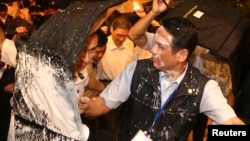China's top official in charge of relations with Taiwan has returned to Beijing, hailing his visit to the self-ruled island as "historic", despite violent protests that forced him to cancel several meetings.
The visit by Zhang Zhijun, director of China's Taiwan Affairs Office, marked the first such trip by such a senior mainland official in 65 years since the Nationalists fled after losing a civil war to China's Communists in 1949.
Throughout his four-day tour of the island, Zhang was greeted by protesters, including at the high-speed train station in the pro-independence southern port of Kaohsiung on Friday. There hundreds of demonstrators gathered, some waving placards reading "Communist Zhang Zhijun, get the hell back to China".
Protesters in the city became violent and at one point attempted to pour white paint on Zhang, but missed him and instead splashed security staff. Some protesters were bloodied after scuffles with police.
An official at Taiwan's Mainland Affairs Council told Reuters by phone that three of Zhang's public appearances had been called off on Saturday following the protests.
"The public appearances were canceled due to twists and turns," the official who was not authorized to speak to media, said.
One of the events was canceled due to security concerns for Zhang at a fair held at a well-known temple in Kaohsiung, the official said.
Hundreds of pro-independence banner-toting demonstrators were at the Taoyuan International Airport near Taipei on Saturday as Zhang prepared to depart for the mainland.
The trip was seen as part of China's charm offensive in Taiwan, where many remain suspicious about a pending trade pact and autocratic China's political designs for the democratically governed island.
Speaking to state media after arriving back in Beijing on Saturday, Zhang glossed over the protests and hailed the trip a success.
"This visit received an enthusiastic welcome from all circles and peoples in Taiwan. Despite differing voices, the popular will is extremely clear," the official Xinhua news agency cited Zhang as saying.
"Everyone universally believes that peaceful development of cross-strait relations is the correct path and brings real benefits to people on both sides. Everyone believes we should continue down this path," he said.
"Cautiously optimistic"
Andrew Yang, a political science professor at National Sun Yat-sen University in Taiwan, said the visit's awkward moments were not likely to alter the calculus between China and Taiwan.
"Something like the protests or paint pouring should be in his [Zhang's] anticipations. I don't think this incident will impact cross-strait relations or slow down cross-strait exchanges," Yang said.
"The agreements that Zhang and his Taiwanese counterpart have reached this time should be implemented at the working levels as planned. I'm cautiously optimistic about ties across the Taiwan Strait," he said.
China claims Taiwan as its own, to be taken by force if necessary, though the two have been ruled separately since defeated Nationalist forces fled to the island following the civil war.
Taiwan's pride in its democracy, ushered in during the 1980s, helps reinforce the unwillingness of many to be absorbed politically by China.
Many Taiwanese look with nervousness, if not fear, at China, where the ruling Communist Party has rebuffed calls for political liberalization.
Their concerns are not just politically motivated. The once heavily industrialized Kaohsiung has lost many of its companies and factories to China, drawn away by China's massive workforce and low manufacturing costs, and it has struggled economically in recent years.
Protesters occupied Taiwan's parliament and mounted mass demonstrations over three weeks starting in March in anger at a pending trade pact that will open various sectors in both economies.
The opposition calls the pact a threat to Taiwan's industry and fears it could open the door to Chinese political influence.
Zhang did not meet with Taiwan's China-friendly president, Ma Ying-jeou, who has never held talks with senior Chinese officials since taking office in 2008.





